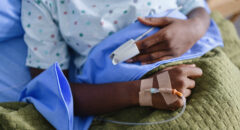
You've got this!!
Try To Stay Calm & Have A "Normal" Day
The unknown always adds an extra layer of worry, and this is something you've never been through before. Try to go about your day as usual to alleviate the emotional toll of chemo treatments. Try to plan your chemo sessions around a time when you usually have free time so that your family and other commitments are not disrupted.
Have A Chemo-Buddy
Please feel free to bring your significant other, sibling, best friend, neighbor, or anybody you'd like. Someone you can rely on will help keep the mood bright.
Maintaining a healthy mind is just as important as maintaining a healthy body. Your chemo pal will remind you to remain smiling when you need it most.
Having a chemo companion daily is ideal, but understanding that it may not always be feasible is essential. Bring along something to take your mind off of things if you need to. Relax and enjoy that you are not entertaining anybody, soak up the quiet time too.
Get Something To Sip On While They Administer Chemo Drugs
You should grab whatever you're hooked to just before you receive your chemo medications and have it in your hand so you may sip or chew while you get the treatment.
Aneela Bemet, B.S.N., from Kaiser Permanente, has suggested that putting something cold in your mouth may help you avoid mouth sores produced by chemotherapy medications by freezing your taste buds, keeping them intact, and reducing the flow of saliva.
RELATED: Starting Chemotherapy? Here’s what you can expect.
Prepare The Port Site
Lidocaine lotion may be used at the port site, so be sure to ask your oncologist for some. As the numbing effects of the cream require time to set in, this should be done at least an hour before your scheduled visit.
When the nurse accesses your port, you may feel some discomfort if this is your first time. Don't rush through the process of accepting the "new normal." Take your time.
Speak To A Dietician
A dietician specializing in cancer nutrition should be available at your infusion facility. The appointment will take around 30 minutes, and you must leave with the knowledge you need to maintain a healthy diet after chemotherapy.
Chemo patients often advise "eat what you want when you're hungry, but everything in moderation." That was the guidance they remembered, and it helped ease one of the concerns: dropping too much weight, which may be dangerous for those who are already frail.
Record Everything
This is especially pertinent in the days after chemotherapy, when you may feel the effects of the medicine more strongly. Keep track of your wake-up time, when you take your medications, the foods you consume, the snacks you want (or don't), your energy levels, and anything else that seems noteworthy.
On days three, four, and five of chemotherapy, several patients reported experiencing the most significant headaches and lowest energy levels.
In order to progress, it's essential to keep track of your emotions as they arise. This will help you organize your next week of treatment and know when you need to reach out for support on days, you're not feeling well, or need someone to assist you with the kids' after-school pick-up, grocery shopping, or food preparation. People want to help, so good advice would be not to refuse their assistance.
RELATED: 10 Must-Have Items When Going Through Chemotherapy
Manage Symptoms
There's a good chance you've heard this piece of advice before and didn't give it much thought. Put your pride aside this time and take your prescription as prescribed.
You should never wait for unwanted effects to appear before taking medications that may help mitigate or avoid them. If you wait, you won't have relief as soon as you could have.
Prepare for your medication by obtaining the necessary prescriptions and learning the recommended dose intervals. You'll feel and think better about it afterward.
Ask As Many Questions As Necessary For Your Comfort
You should always feel comfortable demanding the care your body needs. While you may be unfamiliar with this condition, your oncology nurse or doctor is quite experienced with it.
Talk to your doctor or nurse if you're experiencing any unusual symptoms. If you don't acquire the info you need, keep asking questions. Your curiosity is warranted. Don't be afraid to ask questions; there is no such thing as silly questions. You have support; you are not the only one going through this.
Make Sure To Rest, Relax, & Recuperate
Take it easy for a while and get some much-needed rest. The challenge often lies in this area. That, and admitting you need assistance.
While we sleep, our bodies mend and restore damaged cells and organs. I would guess that your body is going through something it has never experienced before. Time spent resting is necessary for a full recovery.









